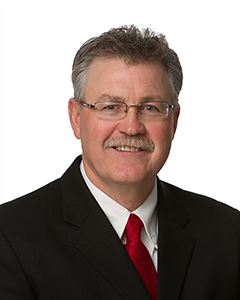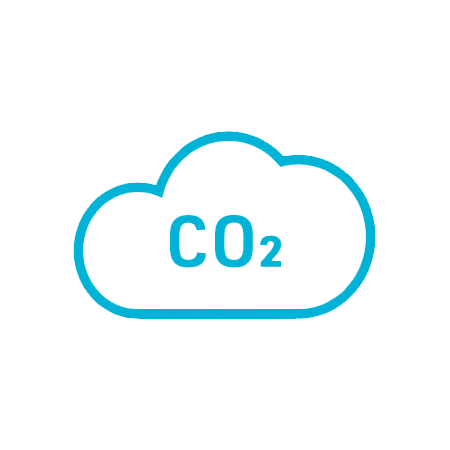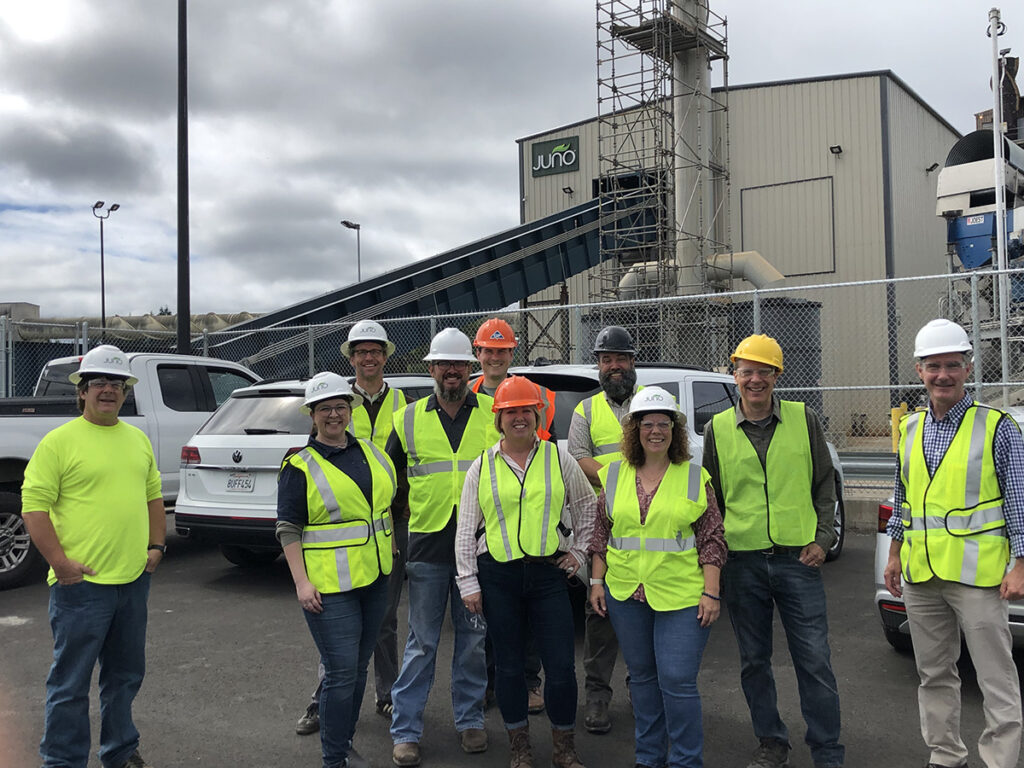439,418 TONS
OF MUNICIPAL SOLID WASTE (MSW) GENERATED IN RAMSEY AND WASHINGTON COUNTIES



Ramsey/Washington Recycling & Energy, or R&E, is a partnership of Ramsey and Washington counties. Through waste reduction programming and responsible waste management, we work toward our vision of “vibrant, healthy communities without waste.”
As Board Chair, it is with great pleasure that I present the Ramsey/Washington Recycling & Energy (R&E) annual report for 2023. The achievements highlighted showcase our dedication to our core values of commitment, teamwork, respect, trust and innovation.
In 2023, we expanded our waste prevention efforts to move waste up the Minnesota waste hierarchy, which guides our work and prioritizes reduction, reuse and recycling. Notably, we launched and expanded the highly anticipated Food Scraps Pickup Program to 40,000 households, with rollout continuing over the next several years, and implemented cutting-edge technology at the R&E Center to support the program. Additionally, programs like mattress recycling, food waste prevention and BizRecycling moved hundreds of thousands of pounds of materials up the waste hierarchy. Our educational initiatives and facility tours have played a crucial role in fostering understanding of the counties’ responsible waste management practices, enhancing community engagement with our mission.
We extend our sincere gratitude to our partners and community members for their continued collaboration and commitment to creating healthy, vibrant communities. As we look to the future, we remain dedicated to advancing our mission and fostering partnerships that contribute to the sustainability and vitality of our communities.


R&E Board Chair, Washington County Commissioner

R&E is the organization through which Ramsey and Washington counties collaborate to responsibly manage waste. Through R&E, the counties strive to protect health and the environment and meet the state of Minnesota’s 75% recycling goal by 2030. R&E offers programs to help residents and businesses reduce waste and recycle better. R&E also manages the R&E Center, which processes trash from the two counties to recover valuable materials and divert waste from landfills. R&E employs 90 union and 33 non-union staff and collaborates with staff from two counties to perform this work.
Through all its work, R&E’s goal is to move materials up the waste hierarchy, pictured below, to ensure those materials don’t arrive at the R&E Center.

The R&E Board governs the organization in carrying out its vision of “vibrant, healthy communities without waste.” Comprising of commissioners from both Ramsey and Washington counties, as well as ex officio members from the City of Newport and the Minnesota Pollution Control Agency, the R&E Board brings together a mix of knowledge and expertise that oversees the impactful work that the organization conducts.

As R&E continues to grow and evolve, several positions were added to the organization to ensure a sustainable staffing level in support of the R&E Center and Joint Activities programs: Food Scraps Pickup Program Supervisor, Food Scraps Pickup Program Communications Specialist, Food Scraps Pickup Program Customer Support Associate, HR Generalist and Contract Specialist.
Ramsey, Washington and Hennepin counties continued to collaborate to maximize diversion of waste resources through integrated waste management solutions. Learn more about the work conducted by the partnership in 2023 by reading the PWE Annual Report.


R&E works with the counties and partners to provide programs to promote waste reduction, reuse and recycling. This collaboration supports local food recovery efforts, helps businesses operate more efficiently and provides resources to help community members live more sustainably.

Working with five transfer stations and over 80 haulers, the R&E Center processes all trash from residents and businesses in the two counties – That’s nearly 14% of the state’s trash! At the R&E Center, trash is processed to recover recyclable metals and to produce fuel used in Xcel Energy power plants to generate electricity. Processing trash keeps it out of landfills and recovers value.

fewer metric tons of CO2 produced than if trash had been landfilled

cars taken off the road for a year
tons of metal recovered for recycling

more tons of waste processed than in 2022

homes powered for a year by electricity generated from refuse-derived fuel produced at the R&E Center
In 2023, there were no instances of MSW odor detections above permitted levels. R&E and its contractors conducted 701 odor inspections in 2023, with only 1.1% resulting in MSW detections, none of which were above permitted levels.
For the past two decades, Ramsey and Washington counties have partnered to evaluate alternative waste management technologies. Through the R&E Board, the counties have prioritized moving high-value materials in waste up the waste hierarchy. The R&E Board envisions a higher use for waste materials in the East Metro to achieve environmental, economic and community benefits for the next 20- to 30-years and beyond. Pursuit of new solid waste management technologies to capture more value from waste is also a key strategy to meet the state’s 75% recycling goal.
The R&E Center’s recent facility enhancements now recover source-separated food scraps and high-value organic-rich materials (ORM) from trash. The higher use of organics, which otherwise becomes RDF or process residue, has taken shape through several years of extensive research, reference facility site visits and engagement with technology providers.
Anaerobic digestion is a technology that converts organics (such as food waste) into clean, renewable energy called biogas. In September 2023, after a 3-year procurement that included a two-phase procurement, multi-dimensional evaluation and competitive negotiations, the R&E Board approved an organic material feedstock supply agreement with Dem-Con HZI BioEnergy, LLC. Under this agreement, Dem-Con will build and operate a digestion facility at their campus in Louisville Township, just outside of Shakopee for a minimum of 50,000 tons per year food scraps and ORM. The biogas will be used as a carbon-negative substitute for fossil fuels, and the remaining solids will be converted into biochar, a beneficial product used for soil amendment and remediation. The digestion facility is estimated to begin operations in early 2027.

The R&E Center manufactures over 333,000 tons per year of refuse-derived fuel (RDF), a value-added product from trash. Currently, Xcel Energy generates electricity from RDF, which powers about 12,500 homes a year. R&E’s agreement with Xcel expires on December 31, 2027. The R&E Board’s strategic road map for solid waste management system establishes “a phased approach to change conversion technology for RDF and diversify markets” in the coming decades. This direction has driven the exploration and evaluation of new processing technologies and end uses for RDF.
In 2023, R&E received proposals from its Request for Information process from providers of processing technologies and end markets for RDF. A crucial part of proposal evaluation is observing technologies operating in real-world conditions. This allows the Board to understand capabilities and fitness to R&E’s needs first-hand. In August, Facility & Finance Committee Chair Martinson, with R&E and county staff, conducted a site visit in Toledo, Oregon, to view a demonstration facility that recovers paper fibers and recyclables from trash. The attendees gathered information on the technology and its potential application to materials produced at the R&E Center.


R&E operates out of three budgets: the Joint Activities Budget, the Facility Budget and the Equipment Maintenance & Repair Budget.
DISCLAIMER: Please note that the financial figures presented in this report are unaudited, and the final audited numbers will be provided at a later date.
JOINT ACTIVITIES BUDGET
Project Management
2,970,130
Business Recycling
3,685,868
Community Waste Solutions
247,753
Food Scraps Recycling
1,049,888
General Outreach
673,995
Policy Evaluation
1,135,613
TOTAL
$9,763,247
The Joint Activities Budget supports a variety of projects to meet goals outlined in the counties’ waste management plans and is funded by Ramsey and Washington counties. Both counties charge a fee associated with collecting trash, referred to as the County Environmental Charge (CEC). A portion of CEC fees fund the Joint Activities Budget.
FACILITY BUDGET
Personnel
8,357,874
Fuel
6,415,362
Landfill
7,322,997
Transportation
8,857,103
Transloading
2,709,278
Operations
10,174,802
Enterprise Reserve Fund (ERF)
1,500,000
Transfer to Equipment Maintenance Fund
300,000
Debt Service
3,533,586
TOTAL
$49,171,001
The Facility Budget supports the operation of the R&E Center. This enterprise budget is funded by tipping fees.
EQUIPMENT, MAINTENANCE AND REPAIR BUDGET
Equipment and Maintenance
1,257,784
TOTAL
$1,257,784
The Equipment Maintenance & Repair Budget supports equipment maintenance, repair and replacement at the R&E Center. This budget is funded by the sale of recyclables recovered from the trash at the R&E Center.